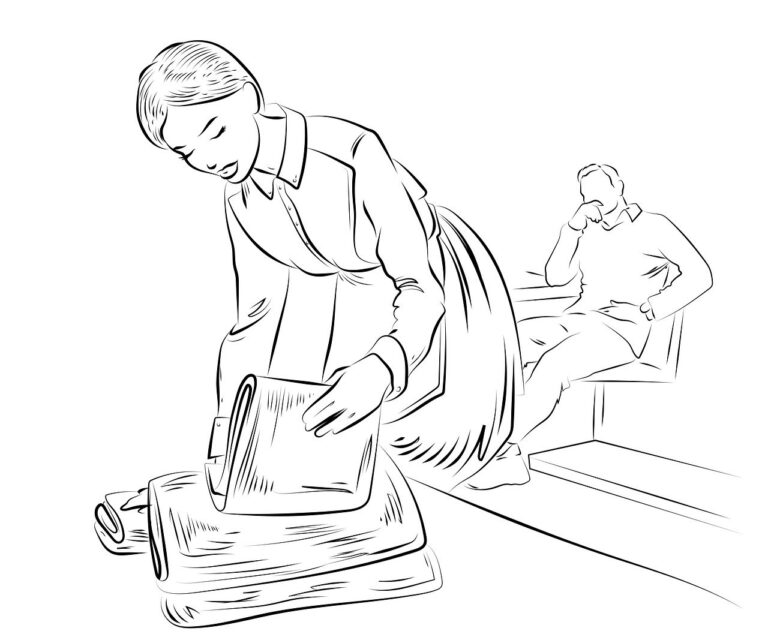Are you always physically tired and mentally exhausted – then you need to read on.
We often use the phrase “disproportionate burden” with women. It crops up everywhere—in discussions about climate change, environmental degradation, and, most persistently, in conversations about unpaid work, especially caregiving. Women, it seems, are always shouldering a “disproportionate burden” of something, or the other.
But take a closer look, and you’ll notice a strange trend: this “burden” is disproportionately high only when it’s something negative or demanding. When it comes to resources, rights, or support, women’s share tends to be disproportionately low. Lately, I’ve been working in the development sector, and in one meeting, someone advised me not to use the word “burden” when talking about caregiving. I was stunned. Are we not even allowed to call it what it is? Why are we still dancing around the edges of “political correctness,” worried about sounding harsh? The reality is, society doesn’t even pretend to care about women when it counts. We have laws, policies, promises—but they’re just rubber stamps. They look nice on paper but rarely deliver real change.
Consider this: show me one woman who hasn’t had to fight tooth and nail for her rightful share of parental property, even though the law guarantees it. Show me one woman who received alimony after divorce without running in bureaucratic circles for years. Show me one woman who isn’t, at some level, struggling to balance her personal life with her professional one.
Sure, there are privileged women at work—some childless, others with grown children—who bend over backward to appease their bosses, by being “one of the boys”, dissing other women or actively harassing them. Because that’s the only way they think they can survive in a ‘boys club’ – after all most workplaces are just that Boys Club. And then there’s the rest of us: juggling, despairing, doing our best to navigate a world that seems reluctant to ease our load despite all the talk about “making it easier for women.” Why do managers still frown at remote work or flexible schedules for women, especially mothers, when we know it’s an essential support? Flexible work isn’t a luxury for most women; it’s a lifeline.
Teaching men to share household work is a great goal, and one we should pursue. But that change will take time. Until then, why can’t we make some practical changes to keep women in the workforce without forcing them to sacrifice their mental health or financial independence? In a society where women are still seen as primary homemakers, why are we so surprised that, when faced with the choice between personal and professional life, women often choose personal?
I could make a long list of things holding women back: lack of access to quality education, decent jobs, safe workplaces, unpaid caregiving, the pay gap, sexism, misogyny. We’ve been talking about these issues for ages, and there are still no clear solutions. Yes, progress is being made, but the pace is too slow.
We need to shift the focus. Let’s start with something simple: flexible working conditions for women. Allowing women to work from home could be the magic wand we seem to have forgotten we had post-COVID-19. With that in place, we can begin addressing the unrealistic expectations placed on women—expectations that drain them without offering support in return. Yes, of course, working from home would add some extra demands on women since they’re often expected to “do it all” if they’re home all day (and let’s be real, most things still pile up by the time they get back from work). But at least it would ease one layer of stress—they wouldn’t feel they’re failing both at home and at work.
From my own personal experience, I can tell you that when I work from home, I’m way more productive. Why? Because cutting out two hours of commute time keeps me calm and organized, both about the home and about work. Not all jobs can be done from home, but for those that can, why can’t we start cutting some slack for women?
And let’s take a serious look at education. Schools need to move beyond exams, grades, and cultural festivals. They should become institutions that prepare the next generation to see the world through a lens of equality. We need workshops, not just for kids but for parents. Children absorb stereotypes from their homes and communities. Teaching equality at school only goes so far when children go home and see the same old patterns reinforced. But if we can reach the parents, we can create real change in the next generation. Don’t tell me parents aren’t the school’s responsibility—they are half of the team, shaping what children believe is “normal.”
If we really want to build a society that supports women, we need to look at all these “disproportionate burdens” and start calling them out. Then we need to find practical, immediate solutions to ease the load, while we work on the larger systemic changes. Only then will we start to see a world where women don’t have to struggle against the odds just to live with dignity and independence.




